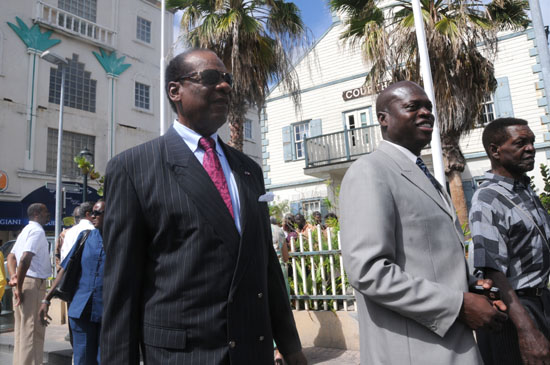 Philipsburg:--- The Supreme Court of the Netherlands quashed the verdict delivered by the Appeals Court on February 10th 2010 against now Member of Parliament Louis Laveist. The Supreme Court found that the appeals court made a technical error by failing to mention the evidence they used to convict Laveist in their sentencing. Article 402 of the criminal procedures states that the sentence must contain the evidence used by the court to convict a suspect.
Philipsburg:--- The Supreme Court of the Netherlands quashed the verdict delivered by the Appeals Court on February 10th 2010 against now Member of Parliament Louis Laveist. The Supreme Court found that the appeals court made a technical error by failing to mention the evidence they used to convict Laveist in their sentencing. Article 402 of the criminal procedures states that the sentence must contain the evidence used by the court to convict a suspect.The Supreme Court orders that the case be retried by the Appeals Court and the suspect can still appeal his case to the Supreme Court if he is not satisfied with the verdict rendered in the new case.
Louis Laveist was convicted on five counts in the lower courts in 2008. Three of the five charges were not proven during the appeal hearing.
The joint court of appeals threw out three of the five charges brought against Laveist who was a commissioner at the time of his arrest and trial. The Appeal Court convicted Laveist of accepting bribes when he accepted an airline ticket to Canada from BEMAL Enterprises and $10,000 for traveling expenses from the same company. The panel consisting of three judges found it proven that Laveist had also accepted $6000.00 from Bargains Unlimited that was paid to his foundation Culture Club in exchange for work permits. Laveist was convicted to six months suspended sentence and three years probation while they banned him from public office for a period of three years. The judges in the appellate court indicated in their ruling that the only reason Laveist escaped harsh punishment was because the investigating offers used illegal ways to obtain evidence against him. The illegal procedures used include the tapping of Laveist's cellular phone for a period of two weeks and the illegal surveillance of his home and movement for the same period of time. The court said the investigating officers violated the councilman's privacy based on the Human Rights Charter. The court threw out the charges of forgery, in two instances. One where he was accused of forging the Culture Minutes in an effort to defraud AMFO of Naf. 22,750. The court also found that the prosecution did not provide sufficient evidence to show that Laveist was the owner of the Barber Shop where migrant Samuel Boney was working.
Click here to view the verdict delivered by the Supreme Court.










